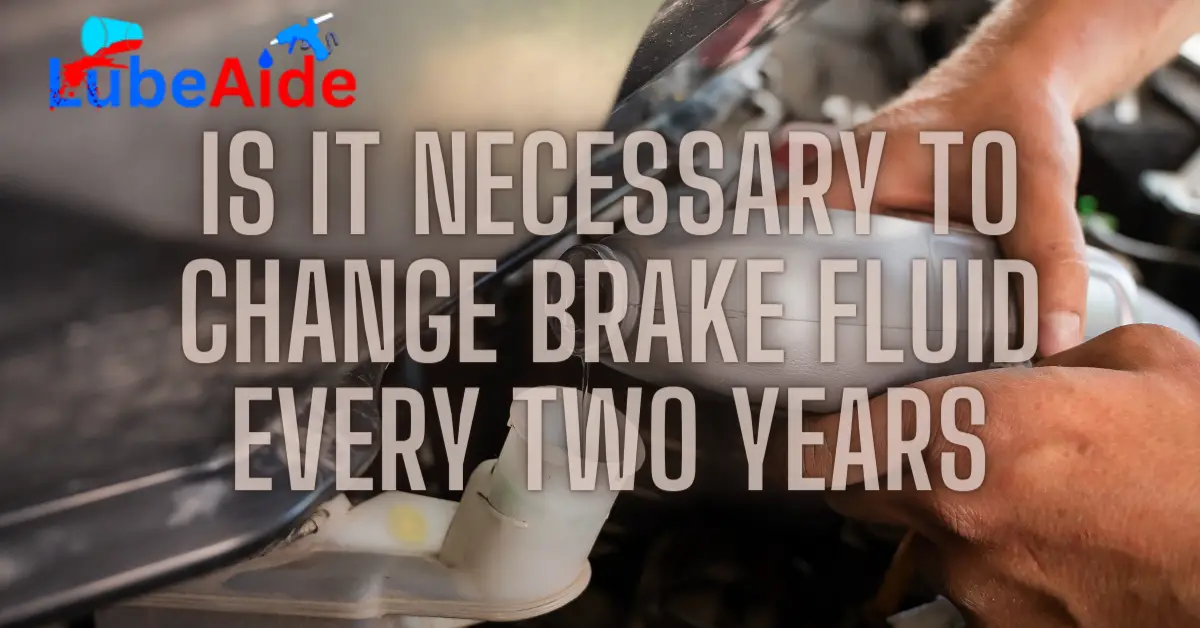Brake fluid is an essential component of any vehicle’s braking system, as it transfers force from the brake pedal to the brake pads, stopping the vehicle. Over time, brake fluid can become contaminated with moisture and other particles, which can compromise its effectiveness and increase the risk of brake failure. This raises the question: Is it necessary to change brake fluid every two years?
In this, we will explore the importance of changing this fluid and the factors that can affect its lifespan. We will also discuss how often you should change your brake and the potential consequences of neglecting this crucial maintenance task.
How Brake Fluid Works
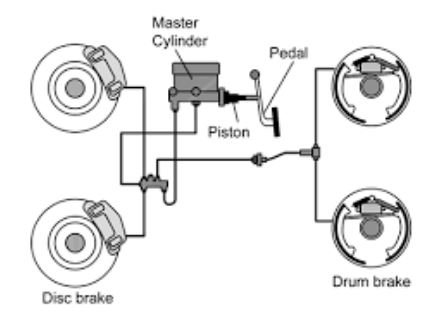
Brake fluid is a hydraulic fluid that is responsible for transferring force from the brake pedal to the brake pads. When you press on the brake pedal, the force generated by your foot is transferred through the brake lines to the brake calipers, which squeeze the brake pads against the rotors, creating friction and stopping the vehicle.
It works by transmitting pressure evenly throughout the braking system. It is designed to operate at high temperatures and maintain its viscosity even under extreme conditions. This is important because the braking system generates a lot of heat, and if this fluid were to boil or lose its viscosity, the brakes would become less effective.
There are two main types of brake fluid: glycol-based and silicone-based. Glycol-based brake is more commonly used and is typically made from a blend of glycols and other additives. It has a higher boiling point and is more resistant to moisture absorption than silicone-based brake fluid. Silicone-based this fluid is less common and is typically used in high-performance applications where extreme temperatures are a concern.
One important thing to note about this fluid is that it is hygroscopic, which means it absorbs moisture from the air over time. This can cause the fluid to become contaminated and less effective at transferring pressure. For this reason, it is important to replace your brake periodically to ensure that your brakes are functioning properly.
The Consequences of Not Changing Brake Fluid
The brake system is one of the most critical safety components in any vehicle, and this fluid plays a vital role in its proper functioning. However, many car owners neglect to change their fluid regularly, which can lead to severe consequences.
Over time, it can absorb moisture from the air, which can cause the fluid to boil when the brakes are applied. This can create air bubbles in the system, which can reduce the effectiveness of the brakes and increase the stopping distance. In extreme cases, the brakes may fail altogether, putting the driver and passengers at serious risk.
In addition to reduced braking performance, contamination it can also cause damage to the brake system’s components. The moisture and other particles in the fluid can cause corrosion and rust in the brake lines, calipers, and other parts, leading to leaks and brake failure.
Not changing this fluid on time can also result in expensive repairs. As the brake system’s components wear out prematurely, the cost of replacement or repair can add up quickly, often exceeding the cost of a simple fluid change.
Is It Necessary to Change Brake Fluid Every Two Years: Recommendation
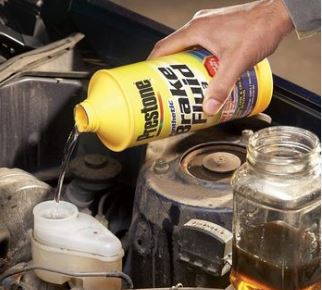
The recommended brake fluid change interval varies depending on the make and model of your vehicle, as well as the type of fluid that is used. However, a general guideline is to change every two years or 24,000 miles, whichever comes first.
This is because it is hygroscopic, which means it absorbs moisture from the air over time. As it becomes contaminated with water, it can cause corrosion inside the braking system, which can lead to decreased performance or even brake failure. Furthermore, the moisture in this fluid can lower the boiling point, causing the fluid to vaporize and reduce its ability to transmit pressure to the brake pads.
The recommended change interval may also vary depending on your driving habits and the climate in which you drive. If you frequently drive in high humidity or mountainous regions where you use your brakes frequently, you may need to change your brake more often.
It is important to note that neglecting to change your fluid can have serious consequences, including decreased braking performance, brake failure, and expensive repairs. Therefore, it is essential to follow the manufacturer’s recommended service intervals and have your fluid changed regularly to ensure your safety on the road.
Signs that Brake Fluid Needs Changing
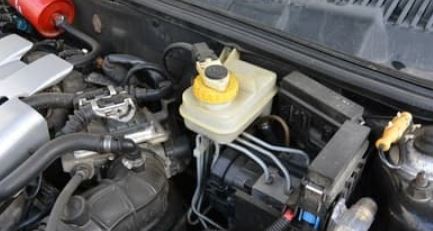
- Decreased Brake Performance: If you notice that your brakes are not as responsive as they used to be, it could be a sign that your brake is contaminated or has absorbed moisture. This can lead to a spongy or soft brake pedal, requiring you to press harder to stop the vehicle.
- Strange Sounds: If you hear grinding or squeaking sounds when you press the brakes, it could be an indication of worn brake pads or rotors. However, it could also be due to the presence of air bubbles or debris in the brake fluid, which can cause the brakes to make unusual sounds.
- Warning Light: Most modern vehicles have a dashboard warning light that illuminates when there is an issue with the braking system. If you see this light, it’s crucial to have your vehicle inspected immediately, as it could be a sign of low fluid or other issues.
- Discolored Brake Fluid: It should be a clear, amber color. If you notice that your brake is dark or discolored, it’s an indication that it’s contaminated and needs changing.
- Burning Smell: If you smell a burning odor when you press the brakes, it could be a sign that your fluid is overheating due to excessive wear or contamination. This can cause the brake system to fail, leading to a dangerous situation on the road.
The Brake Fluid Change Process
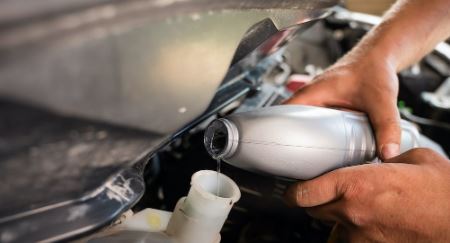
- Locate the brake fluid reservoir: The reservoir is typically located on top of the brake master cylinder under the hood of your car. Consult your vehicle owner’s manual to find the exact location.
- Clean the reservoir: Before you begin the change process, it is essential to clean the reservoir thoroughly. Use a clean cloth to wipe away any dirt or debris that may have accumulated around the cap.
- Remove the old brake fluid: Open the cap of the brake reservoir and use a syringe or a turkey baster to remove the old fluid from the reservoir. Be careful not to spill any fluid on your skin or painted surfaces, as it can cause damage.
- Bleed the brakes: Bleeding the brakes is the process of removing air from the brake lines. Start by connecting a brake bleeding kit to the brake caliper on the furthest wheel from the master cylinder. Open the valve on the kit and pump the brake pedal until the fluid runs clear.
- Refill the reservoir: Once you have bled the brakes, refill the fluid reservoir with fresh fluid. Be sure to use the type of fluid recommended by the vehicle manufacturer.
- Test the brakes: After you have refilled the reservoir, test your brakes by pumping the pedal a few times. If the pedal feels spongy or soft, you may need to bleed the brakes again.
Pros and Cons Of Brake Fluid Change
Pros:
- Increased Safety: The brake is hygroscopic, which means it attracts moisture. Over time, this moisture can compromise the effectiveness of your brakes, potentially leading to brake failure. Regularly changing your brake helps ensure that your brakes are working correctly, reducing the risk of accidents.
- Improved Performance: As fluid ages, it can become contaminated with debris and particles. This can reduce the effectiveness of the fluid and cause your brakes to feel spongy or unresponsive. Changing your brake can improve the performance of your brakes, ensuring that they respond quickly and effectively when you need to stop.
- Longer Brake System Lifespan: Changing your brake can help extend the lifespan of your brake system. Contaminated it can cause corrosion and other damage to your braking system components, potentially leading to costly repairs. Regularly changing your brake helps prevent these issues and prolongs the life of your brake system.
Cons:
- Cost: Changing your fluid can be an expensive maintenance task, especially if you take your vehicle to a professional mechanic. However, the cost of changing your brake is minimal compared to the potential cost of brake failure.
- Time: Changing your brake can be a time-consuming task, depending on your vehicle’s make and model. However, the time investment is worth it to ensure that your brakes are functioning correctly.
- Environmental Impact: Used brake is considered hazardous waste and must be disposed of correctly. This means that changing your fluid can have an environmental impact, but this impact can be minimized by properly disposing of the used fluid.
How to Choose the Right Brake Fluid Change Service
- Qualifications and Experience: Look for a service provider who has qualified and experienced technicians who are knowledgeable about brake systems and have the necessary skills to handle your vehicle.
- Reputation: Check the reputation of the service provider by reading reviews and ratings from other customers. Positive reviews and high ratings indicate that the service provider is reliable and provides quality services.
- Type of Brake Fluid: Ensure that the service provider uses the recommended fluid for your vehicle. The wrong type of fluid can cause damage to the braking system and compromise your safety.
- Equipment and Tools: Choose a service provider who uses modern and reliable equipment and tools for changing the brake fluid. This ensures that the brake change is done correctly and efficiently.
- Price: Compare prices from different service providers to ensure that you are getting a fair price for the service. However, don’t compromise on quality for the sake of a lower price.
- Additional Services: Some service providers offer additional services, such as a brake system check or brake pad replacement. Consider choosing a provider who offers these services to ensure the overall health of your braking system.
Alternative Methods for Maintaining Brake Fluid
Changing brakes every two years is a recommended practice by most manufacturers and mechanics, as it helps to maintain the quality and effectiveness of the fluid. However, there are some alternative methods for maintaining a brake that may extend its lifespan and keep your brake system functioning properly.
One such method is using a brake tester, which measures the moisture content of the fluid. If the tester indicates that the moisture level is too high, it may be time to change the fluid. This method is less expensive than a full brake flush and can provide a good indication of when the fluid needs to be changed.
Another method is adding a brake conditioner to the system. These products claim to remove moisture and other contaminants from the fluid, improve its lubrication, and extend its lifespan. However, it’s important to note that not all brake conditioners are created equal, and some may even harm the system if not used properly.
Regular inspections of the brake lever and condition can also help to identify potential issues early on. If the fluid is discolored or has a burnt smell, it may be time for a full brake flush. Additionally, if you notice any leaks in the system, have them repaired immediately to prevent contamination of the fluid.
While these alternative methods may help to extend the life of your brake fluid, it’s important to keep in mind that regular changes are still the best way to ensure the safety and effectiveness of your brake system. If you’re unsure about the condition of your fluid or how often it should be changed, consult your vehicle owner’s manual or a trusted mechanic for guidance.
Misconceptions About Brake Fluid Change
- Brake fluid doesn’t need to be changed if the vehicle is rarely used: This is false. Even if a vehicle is not used frequently, the brake can still absorb moisture from the air over time, which can lead to corrosion and reduced braking performance.
- Brake fluid only needs to be changed if there is a problem: This is also false. Regular changes are necessary to maintain the effectiveness of the braking system and prevent potential problems from occurring.
- It’s okay to mix different types of brake fluid: This is a dangerous misconception. Mixing different types of fluid can cause chemical reactions that can damage the braking system and reduce performance.
- Brake fluid changes are unnecessary for vehicles with ABS: This is incorrect. ABS systems still rely on clean brake fluid to operate correctly, and neglecting to change it can compromise the system’s performance.
- It’s safe to ignore the recommended brake fluid change intervals: This is a significant misconception. Brake fluid change intervals are recommended based on the manufacturer’s specifications, and neglecting to follow them can lead to reduced performance and potential safety hazards.
FAQs About Changing Brake Fluid Every Two Years
Why is it necessary to change brake fluid every two years?
Brake fluid is hygroscopic, meaning it can absorb moisture over time, which can compromise the effectiveness of the braking system. Changing the fluid every two years ensures that it remains clean and free of contaminants.
What happens if I don’t change my brake fluid every two years?
Neglecting to change brake fluid can lead to reduced performance and potential safety hazards. The fluid can become contaminated, which can cause corrosion and damage to the braking system and reduce its effectiveness.
Can I change my brake fluid myself, or should I take it to a mechanic?
While it is possible to change your brake fluid yourself, it is recommended that you take your vehicle to a qualified mechanic to ensure that the job is done correctly and safely.
How do I know when it’s time to change my brake fluid?
Check your vehicle’s owner’s manual for the manufacturer’s recommended brake fluid change interval. You can also have a mechanic check the fluid during routine maintenance or if you notice any changes in the brake pedal’s feel or performance.
Do all vehicles require a brake fluid change every two years?
Not all vehicles require a brake fluid change every two years. Check your vehicle’s owner’s manual for the manufacturer’s recommended brake fluid change interval.
Is it safe to ignore the recommended brake fluid change interval?
Neglecting to change brake fluid according to the manufacturer’s recommended interval can compromise the performance of the braking system and increase the risk of safety hazards. It is essential to follow the recommended interval to ensure that your brakes remain effective and safe.
Final Thought
In the end, based on industry standards and manufacturer recommendations, is it necessary to change brake fluid every two years? Neglecting to do so can compromise the safety and performance of the brake system, putting the driver, passengers, and other motorists at risk. Brake fluid is prone to moisture absorption, which can lead to corrosion and decreased functionality of brake components. Regularly changing the brake fluid helps to ensure that the brake system is operating at its optimal level, providing reliable stopping power when needed. Therefore, car owners should not overlook this crucial maintenance task and prioritize changing their brake fluid every two years to maintain a safe and reliable vehicle.
Related Topics:
- What Can I Use Instead of Brake Fluid
- brake fluid low but no leak
- How Long Can You Drive Without Brake Fluid
- No Brake Fluid to One Wheel
- can you add brake fluid while car is hot
- Brake Fluid Leaking from Caliper Bolt
- what happens when brake fluid is low
- When to Flush Brake Fluid
- Does Brake Fluid Leak When Car is Off
- How to Dispose of Brake Fluid

